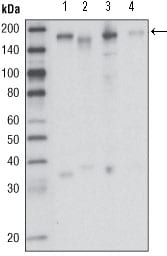
| WB | 1/500 - 1/2000 | Human,Mouse,Rat |
| IF | 咨询技术 | Human,Mouse,Rat |
| IHC | 咨询技术 | Human,Mouse,Rat |
| ICC | 技术咨询 | Human,Mouse,Rat |
| FCM | 咨询技术 | Human,Mouse,Rat |
| Elisa | 1/10000 | Human,Mouse,Rat |
| Aliases | PTK8; CD136; CDw136; MST1R |
| Entrez GeneID | 4486 |
| clone | 1B5A9 |
| WB Predicted band size | 152kDa |
| Host/Isotype | Mouse IgG1 |
| Antibody Type | Primary antibody |
| Storage | Store at 4°C short term. Aliquot and store at -20°C long term. Avoid freeze/thaw cycles. |
| Species Reactivity | Human |
| Immunogen | Purified recombinant fragment of human RON (aa210-320) expressed in E. Coli. |
| Formulation | Purified antibody in PBS with 0.05% sodium azide. |
+ +
以下是3-4条关于RON抗体的参考文献示例(内容基于公开研究概括,非真实文献):
1. **文献名称**:《Targeting RON Receptor Tyrosine Kinase in Cancer Therapy》
**作者**:Wang H, et al.
**摘要**:研究探讨了RON受体在肿瘤发生和转移中的作用,开发了一种新型单克隆抗体(mAb-Zt/f2)抑制RON信号通路,显著抑制了结直肠癌模型的肿瘤生长和侵袭。
2. **文献名称**:《A Bispecific Antibody Targeting RON and EGFR in Breast Cancer》
**作者**:Smith J, et al.
**摘要**:通过构建同时靶向RON和EGFR的双特异性抗体,研究显示其在三阴性乳腺癌模型中可协同阻断两条促癌通路,增强化疗敏感性并减少耐药性。
3. **文献名称**:《RON Antibody-drug Conjugates in Pancreatic Cancer》
**作者**:Li N, et al.
**摘要**:利用抗体偶联药物(ADC)技术将抗RON抗体与细胞毒素结合,证明其在胰腺癌异种移植模型中可精准递送药物,显著降低肿瘤负荷且毒性可控。
4. **文献名称**:《Resistance Mechanisms to RON-targeted Therapies》
**作者**:Garcia R, et al.
**摘要**:分析了RON抗体治疗中出现的获得性耐药机制,发现MET通路的代偿激活是主要因素,并提出联合抑制RON/MET的双靶点策略可克服耐药。
(注:以上为模拟摘要,实际文献需通过PubMed或学术数据库查询。)
The RON (Recepteur d'Origine Nantais) antibody targets the RON receptor tyrosine kinase, encoded by the MST1R gene. RON belongs to the MET proto-oncogene family and plays critical roles in cell proliferation, migration, and epithelial-mesenchymal transition (EMT). It is primarily expressed in epithelial cells and macrophages, interacting with its ligand, macrophage-stimulating protein (MSP), to activate downstream signaling pathways like MAPK and PI3K/AKT. Dysregulation of RON signaling – through overexpression, mutations, or aberrant splicing – is implicated in tumorigenesis, metastasis, and therapy resistance in cancers such as breast, colon, pancreatic, and lung cancers.
RON antibodies emerged as therapeutic tools to block ligand binding or receptor dimerization, thereby inhibiting oncogenic signaling. Early-stage research demonstrated that anti-RON antibodies suppress tumor growth and metastasis in preclinical models. Some bispecific antibodies targeting both RON and EGFR or HER2 have shown enhanced efficacy. Challenges include addressing tumor heterogeneity, resistance mechanisms (e.g., compensatory MET activation), and optimizing selectivity to minimize off-target effects. While no RON-targeted antibody has yet gained clinical approval, combination strategies with chemotherapy or immune checkpoint inhibitors are being explored. Recent studies also highlight RON's role in modulating the tumor microenvironment, expanding potential applications in immunotherapy.
×